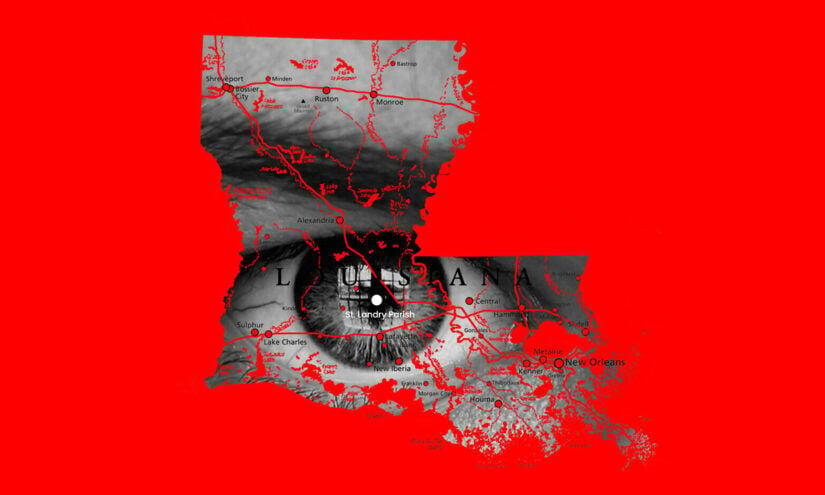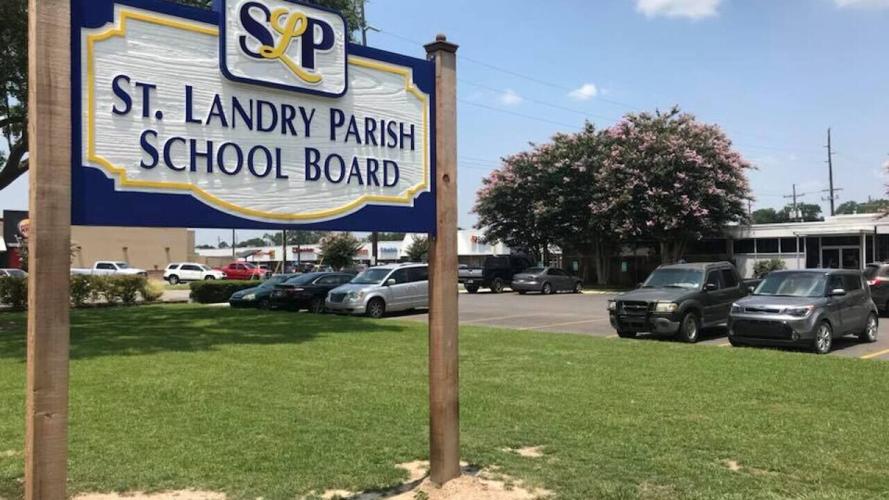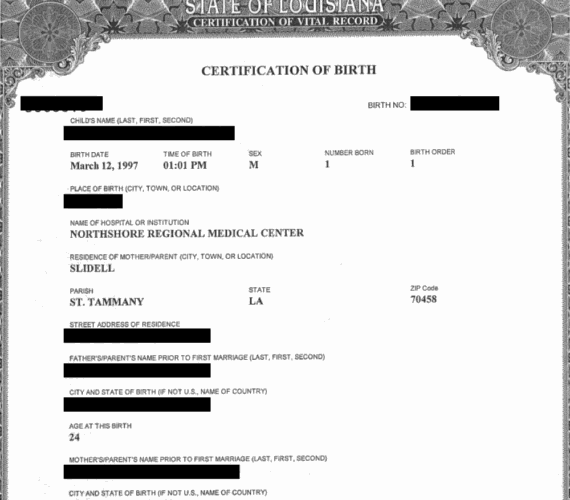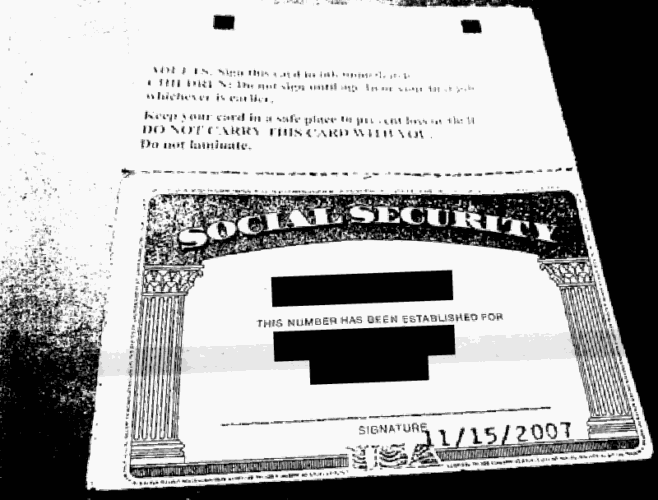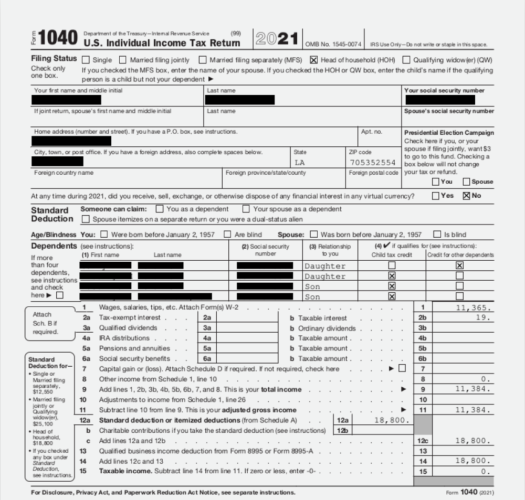It was early August when teacher Heather Vidrine first heard about a cyberattack on her former school district in St. Landry Parish, but she didn’t think much about it — even after her Facebook got hacked.
Now, she’s left to wonder whether the two are connected.
Her Social Security number and other personal information were stolen in a ransomware attack against her former employer, the St. Landry Parish School Board, an investigation by The Acadiana Advocate and The 74 revealed. The reporting included a data analysis by The 74, a national nonprofit newsroom that focuses on education, of some 211,000 files that a cybercrime syndicate leaked online in August after the district refused to pay a $1 million ransom.
The school district told the public in August that its hacked computer servers did not contain any sensitive information, but an analysis of the files that were published online following the attack tells a different story.
Four months after the attack, the joint investigation revealed that Vidrine was among thousands of students, teachers and business owners who had their personal information exposed online. More than a dozen victims said they were similarly unaware those details were readily available, leaving them vulnerable to identity theft.
The number of cyberattacks on K-12 school districts and breaches of their sensitive student and employee data have reached critical levels — enough to prompt the Biden White House to convene an August summit on how to tackle the threat — and in multiple instances, districts have been accused of withholding information from the public.
“They want to brush everything under the rug,” said Vidrine, who worked for St. Landry schools for eight years before leaving in 2021. “The districts don’t want bad publicity.”
Among the district’s breached documents are thousands of health insurance records with the Social Security numbers of at least 13,500 people, some 100,000 sales tax records for local and out-of-state companies and several thousand student records including home addresses and special education status.
A failure to notify families and educators such personal information was leaked, experts said, could run afoul of Louisiana’s data breach notification rules.
Louisiana law mandates that schools and other entities notify affected individuals “without unreasonable delay,” and no later than 60 days after a breach is discovered.
Breached entities that fail to alert the state attorney general’s office within 10 days of notifying affected individuals can face fines up to $5,000 for every day past the 60-day mark.
The St. Landry district discovered the cyberattack in late July and reported it to state police and the media within days. District administrators dispute that the hack led to a breach of sensitive information but also acknowledged last week they haven’t taken steps to understand the scope of what was stolen or to notify individual victims.
In some circumstances, entities can delay their notice to victims if doing so could compromise the integrity of a police investigation and law enforcement sources confirmed an active criminal probe. Under Louisiana law, the state attorney general’s office must approve such disclosure delays.
Reporters filed a public records request with the state attorney general's office Oct. 23 asking for any breach notices from the St. Landry district. The office responded Nov. 2 that the request did not yield any results, indicating such a disclosure was never made. The office didn’t respond to further questions about whether it was looking into St. Landry's apparent failure to file a breach notice or if the district had requested an extension on its notification obligations based on the ongoing state police investigation.
As time drags on, breach victims remain unprotected and unaware of their heightened risk of identity theft. James Lee, the chief operating officer of California-based Identity Theft Resource Center said a four-month delay is “a long time to not notify somebody of that level of sensitive information.”
“Because the school district hasn’t issued a notice, then it’s hard to know exactly what happened and why,” Lee said. “That’s important because that also leads you to, ‘Well, what does the individual need to do to protect themselves now that their information has been exposed?’”
‘Double extortion’
Ransomware attacks have become a growing threat to U.S. schools and breaches in some of the largest districts have attracted scrutiny. But experts said that small- and mid-sized districts are even more vulnerable to attacks and leaders there face political pressures that could lead them to downplay their far-reaching consequences.
The first indication of a problem with St. Landry’s computer network came in late July, when an employee in the district's central office reported spyware on their device, Superintendent Milton Batiste III said in August following the attack.
The ransomware group Medusa, believed by cybersecurity experts to be Russian, has taken credit for the St. Landry Parish leak. The syndicate has leveled multiple school district attacks, including a massive breach in Minneapolis earlier this year.
A district spokesperson confirmed last week that it refused to pay the ransom, in line with what federal law enforcement advises. By mid-August, the trove of stolen files was publicized on a website designed to resemble a technology news blog — a front of sorts — and became available for download on Telegram, an encrypted social media platform that’s been used by terror groups and extremists.
The threat actors appeared to employ a tactic that’s grown in popularity in recent years called “double extortion.” Hackers gain access to a victim’s computer networks, often through phishing emails, download compromising records and lock them with encryption keys. Criminals then demand the victim pay a ransom to regain access. When victims fail or refuse to pay, the files are published online for anyone to exploit.
Current and former students were affected by the attack, though the number of exposed records that contain personal information about young people is far narrower than those of current and former district staff.
One St. Landry mother, who is also a district employee, was outraged when she learned that her son’s information was leaked — especially because he hasn’t attended a district public school for two years. The woman, who asked not to be identified for fears she could lose her job, was livid that the district had claimed employee and student records had been kept safe. She said she was offered free credit-monitoring services after a recent cyberattack on the state Office of Motor Vehicles led to a statewide data breach.
“If they’re lying about it and our information did get out there, then that’s a whole other situation,” she said. “They're telling all their employees all of our information did not get messed with.”
She implored district leaders to notify the parents of children who had their information exposed, including those whose kids are no longer in the school system. If she had known her 17-year-old son was caught up in the breach, she said, she could have already taken steps to protect him.
District officials said they were unaware of the extent of the breach. Tricia Fontenot, the district’s supervisor of instructional technology, said after notifying state police about the attack the board was never told the nature of the data that was stolen or if any data was stolen at all. She said when the board asked state police for updates, it was told an active investigation was in progress and no information could be released.
It did not give a timeline for when its investigation would be completed.
“We never received reports of the actual information that was obtained,” she said. “All of that is under investigation. We have not received anything in regards to that investigation.”
The board, Fontenot said, decided to “trust the process.”
As seen in other school district cyberattacks across the country, however, law enforcement's responsibility is to try and apprehend the cybercriminals, not to determine the extent of a breach or provide information needed to notify or protect district employees and students. That work is done by the school districts, who often hire cybersecurity consultants to help carry out those complex tasks.
Byron Wimberly, St. Landry’s computer center supervisor, maintained that the compromised servers had not been used to store personal information. He used the frequency of cyberattacks as grounds to question whether St. Landry was the source of the breached data.
“You know how many people get hacked a year? Can you point that to the school board 100%?” Wimberly said.
However, evidence that the leaked sensitive data is a result of the July cyberattack is overwhelming, namely the more than 200,000 files posted to Telegram that link back to St. Landry schools. In fact, folders that were breached and uploaded to the web point in part to a central office clerk, who saved many of the most sensitive files to one of the least secured places: her computer’s desktop.
The records identify more than 2,700 current and former St. Landry Parish students, including their full names, race and ethnicity, dates of birth, home addresses, parents’ phone numbers and login credentials for district technology. Spreadsheets listed students who were eligible for special education services and those who were classified as English language learners.
The health records that include Social Security numbers and other personally identifiable information for at least 13,500 people far exceed the number of individuals currently employed by the district. That’s because the records also encompass former employees, retirees and those who have since died, as well as their dependents, including spouses and children. Attached to the records are scanned copies of formal documents about major life events: births, marriages, divorces and deaths.
Thousands of people who have received retirement benefits from the school district had their full names published, along with Social Security numbers and health insurance premiums.
Also included are some 100,000 sales tax records for local and out-of-state companies that conducted business in St. Landry Parish, with affected individuals extending far beyond Louisiana borders. Local victims include the owners of a diner, a gun store and an artist who makes soap with goat milk. It also includes a metal pipe company in Alabama, an Indianapolis-based cannabis company and a senior official at Ring, the Amazon-owned surveillance camera company headquartered in Santa Monica, California.
Unlike most states, Louisiana lacks a central sales tax agency. Instead, there are 54 different collection agencies that range from sheriff’s offices to parish governments to school boards. St. Landry Parish’s sales tax collection office is overseen by the St. Landry Parish School Board. Louisiana schools’ largest source of local revenue is derived from sales taxes.
Thousands of other files appeared to get captured at random: A limited set of files with student disciplinary records, a collection of wedding photographs, documentation for campus security cameras and artistic renderings of Jesus Christ.
Amelia Lyons, the co-owner of a St. Landry Parish glass business whose information was exposed, said a call from a reporter was the first time she had heard about the breach — a reality she called “alarming.”
“I feel like I should have gotten a more formal notification about this,” Lyons said.
‘A soft target’
The St. Landry Parish breach is part of a disturbing increase in cyberattacks targeting school districts nationally in the past few years, with victims ranging from rural school systems to those in major metropolitan areas such as Los Angeles, Las Vegas, Minneapolis and suburban Washington, D.C.
Ransomware attacks on the national education sector have surged by 80% in the past year alone, according to a recent report by the nonprofit Institute for Security and Technology. Earlier this year, hackers waged attacks on seven Louisiana colleges over four months, among them Southeastern Louisiana University, which also faced a data breach and claims it hadn’t been forthcoming with the public.
It’s also not the first time St. Landry schools have fallen victim. In 2020, the school board took its system offline for at least two weeks following a similar cyberattack.
While hacker groups have grown more sophisticated, school districts routinely maintain outdated technology and lack expertise and dedicated staff to thwart threats, said Kenny Donnelly, executive director of the Louisiana Cybersecurity Commission, which was created to help schools and other entities bolster their defenses. As a result, schools are “low-hanging fruit,” said Donnelly, who said that educators should expect to see even more attacks in the coming years.
“Educational entities are going to be a soft target,” he said. “If they’re not being hit, they're going to be hit if they're not doing the things they need to do to get their networks and their security in order.”
Still, experts say leaders at small and mid-sized districts are often surprised when they become the targets of international cybercriminals.
“They’re such a small fish in the ocean, (they think) why would anybody bother with them?” said Doug Levin, the national director of the nonprofit K12 Security Information eXchange.
It’s improbable that hackers targeted St. Landry specifically, he said, and more likely that a district employee opened a spam email and clicked on a phishing link.
“It’s a question of them throwing their fishing hook in the barrel … and just waiting to see who bites,” Levin said. “They don’t know who their next victim is going to be and they don’t really care.”
When a small- or medium-sized district takes the bait, the impact can be substantial because they’re often among their communities’ largest employers. In the roughly 80,000-resident St. Landry Parish, the breached health insurance records represent roughly 1 in 6 residents.
‘A cause of action’
Data breach victims who were contacted for this story said the district should have taken more proactive steps to notify them that their sensitive information had been stolen.
“I just want (the district) to be professional,” said Vidrine, the former science teacher. “A notification that this happened: ‘We’re tending to it and you need to protect yourself. We made a mistake.’”
The district also faces risks of civil liability, said Chase Edwards, an associate law professor at the University of Louisiana at Lafayette. A failure to notify affected individuals is “what class actions are made of,” Edwards said.
The school district has a duty to protect any private information they collect, Edwards said, and are both legally and ethically obligated to notify breach victims.
About 1.25 million U.S. children are the victims of identity theft each year, according to a recent report by the research firm Javelin. Social Security numbers and other personal information about children are particularly valuable to thieves, who can use the records to obtain credit cards and loans without detection for years.
Because children don’t typically have credit cards, they also don’t receive credit reports that can alert them when something is amiss, Lee said. Dark-web marketplaces that sell personal information often put a premium on children’s Social Security numbers, which Lee said are primarily used by fraudsters to apply for jobs. Once victims learn they’ve been compromised, the problem “is not easy to address and can have lifelong impacts,” he said.
Death certificates and obituaries included in the St. Landry breach present their own unique set of risks. Even after death, Social Security numbers and other personally identifiable information that can be mined from obituaries is valuable to criminals who carry out a type of identity theft known as “ghosting.”
‘The hacker of today'
People whose information may have been compromised should assume that identity theft criminals will try to use it nefariously and take steps to protect themselves, Lee said. Such criminals, he said, are often part of “very sophisticated networks” based overseas.
“It’s not the Hollywood version of somebody sitting in a dark room in a hoodie with a can of Red Bull and Twinkies,” Lee said. “That’s not the hacker of today. They’re not sitting in their parents’ basement. They’re in call centers in Dubai and in Cambodia and in North Africa.”
It’s important that potential victims freeze their credit, Lee said, and implement robust privacy protections on their online accounts, including two-factor authentication and unique login credentials stored in password managers.
A finance and technology executive whose information was compromised in the St. Landry breach knows firsthand the headaches that come with identity theft: Following a previous incident, he said, someone used his information to file a false tax return.
The executive, who asked not to be named because he wasn’t authorized to speak with the press, has never stepped foot in St. Landry Parish. Yet his data was exposed because his former employer conducts business there. Having stringent security measures in place offered him peace of mind, he said, when he learned from a reporter that his information had again been exposed.
Fontenot said efforts to notify will begin when state police wrap up their investigation and that district leaders, including the school board attorney, will identify a course of action.
But St. Landry should take immediate steps to protect breach victims — including a notification to the state cybersecurity commission, said Donnelly, its executive director.
“That they didn’t notify us of this, it’s disappointing,” said Donna Sarver, a math teacher who worked for the district for three years before leaving in 2020. She and other victims, she said, now have to fend for themselves.
“But it’s a poor parish and I don’t think they do anything unless they really, really have to.”
This story was supported by a grant from the Fund for Investigative Journalism.

